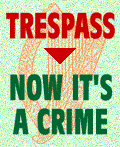|
|
Travellers and activists to protest new Public Order Act national |
miscellaneous |
feature national |
miscellaneous |
feature
 Sunday April 28, 2002 22:00 Sunday April 28, 2002 22:00 by IMC Editorial Group - IMC Ireland by IMC Editorial Group - IMC Ireland

The New Law Under these new laws, tagged onto the end of an otherwise normal housing bill, it's now a crime to enter and occupy or bring any object onto property (private or for the use of the public) where doing so would (among other things) damage, "affect any amenity", or prevent or interfere with the use of the property. The penalty for this offence is EUR 1000 and/or 1 month in prison. If a Garda thinks that you're committing a crime under this law, you can be asked to give your name and address and/or leave the property (after informing you of the offence). Failure to do so (including giving "false or misleading" details) is also an offence - with the same penalty again. The rest of the new section relates to the confiscation of "objects" (read: caravans) that are brought onto property without permission. This law creates, for the first time, a wide-ranging crime of trespass. Until now, there was no such thing - coming onto private property without permission could leave you liable to be sued in civil court, but no more, unless you were "causing fear" or intending to commit a crime. Apart from the serious consequences for Travellers and other minority groups, it is clear that trade unionists, environmentalists and students (who could now face criminal charges as a result of "sit-ins" on their own campuses) have much to fear from a zealous enforcement of this law. The 1994 Act (not changed) The sections of the Act that are used against political protestors on a frequent basis are sections 6, 7 and 8. The first offence is the use of "threatening, abusive or insulting" words or behaviour in a "public place" (including roads, trains, and areas where the public can normally access - indoor or outdoor). These words or actions must be intended to or "reckless as to" (a legal standard that's not as demanding as having intended to do something) provoke a "breach of the peace" (a very loose concept that's never been defined by any law). The penalty for this is £500 (EUR 635) and/or 3 months in jail. Section 7 prohibits the distribution or display in public of material that's threatening, abusive, insulting or obscene. The same conditions on intent and breach of the peace apply, and the penalty's also the same as section 6. This provision was believed to be directed at "pro-life" activists who display graphic images of foetuses as part of their protests. One section of the Act that will be immediately familiar is section 8 - failure to comply with a direction of a Garda under sections 4-7 of the Act. So if a Garda suspects that you are or have been breaking the Act, then you can be asked either to "desist" from doing so, or to leave peacefully. The penalty is again £500 and /or six months. Furthermore, if you're suspected to be "loitering" and causing a "reasonable apprehension" of threatening the safety of other people, property or the "public peace", you can also be asked to move on. Defences to loitering are "lawful authority or reasonable excuse". Finally, there's section 9, which says that you can't block people or vehicles in a public place, again without authority or excuse. The fine here is £200 - but most marches and protest could be said to be either "lawful" or provide for "reasonable excuse" - and you have to have "wilfully" (i.e. deliberately) stopped the vehicle or person. For example, a cyclist has lawful authority to use the road, so a critical mass (moving) protest shouldn't be covered by this section. See the laws for yourself, at the Oireachtas website (PDF file: section 19 - the new trespass law) and the Statute Book Online (the Public Order act) |






















 The Public Order Act, passed in 1994 and subsequently one of the more draconian and controversial pieces of Irish legislation, has come back into the public eye with the passing of amendments related to "trespassing" in the dying days of the Dáil. Activists have certainly been aware of this Act as it stands, as it's one of the most effective weapons of the Gardai when confronted with any demonstration. Even when it was originally passed, politicians argued about the wording for weeks and the President (Mary Robinson) summoned the Council of State to consider if it was even constitutional. The new offences have the potential, if used in a certain way, to further curtail civil liberties and the right to protest. They are directed towards members of the Traveller community - who have called a
The Public Order Act, passed in 1994 and subsequently one of the more draconian and controversial pieces of Irish legislation, has come back into the public eye with the passing of amendments related to "trespassing" in the dying days of the Dáil. Activists have certainly been aware of this Act as it stands, as it's one of the most effective weapons of the Gardai when confronted with any demonstration. Even when it was originally passed, politicians argued about the wording for weeks and the President (Mary Robinson) summoned the Council of State to consider if it was even constitutional. The new offences have the potential, if used in a certain way, to further curtail civil liberties and the right to protest. They are directed towards members of the Traveller community - who have called a  printable version
printable version

 Digg this
Digg this del.icio.us
del.icio.us Furl
Furl Reddit
Reddit Technorati
Technorati Facebook
Facebook Gab
Gab Twitter
Twitter